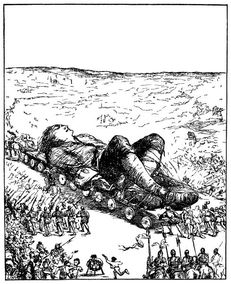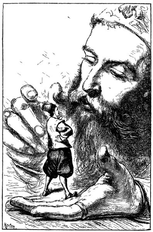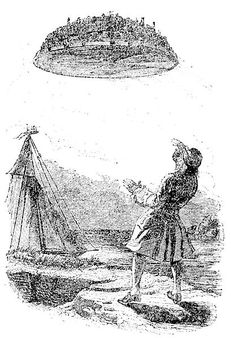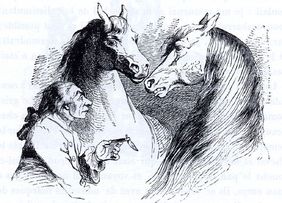Adventures of Gulliver
|
Gulliver's Travels in Lilliput

Gulliver's Travels in Lilliput
Imagine yourself being shipwrecked on an island and finding out that you are a prisoner of people who are only as tall as the palm of your hand! Everything in their world is a miniature replica of your world. They consider you a giant and are afraid of the harm you can cause. However you win their confidence and even help them vanquish their enemies by stealing their feet. Read more of Gulliver's amazing personal account in Gulliver's Travels in Lilliput
Part II: A Voyage to Brobdingnag 20 June 1702 — 3 June 1706

When the sailing ship Adventure is steered off course by storms and forced to go in to land for want of fresh water, Gulliver is abandoned by his companions and found by a farmer who is 72 feet tall He brings Gulliver home and his daughter cares for Gulliver. The farmer treats him as a curiosity and exhibits him for money. The word gets out and the Queen of Brobdingnag wants to see the show. She loves Gulliver and he is then bought by her and kept as a favourite at court.
Since Gulliver is too small to use their huge chairs, beds, knives and forks, the queen commissions a small house to be built for Gulliver so that he can be carried around in it. This box is referred to as his travelling box. In between small adventures such as fighting giant wasps and being carried to the roof by a monkey, he discusses the state of Europe with the King. The King is not impressed with Gulliver's accounts of Europe, especially upon learning of the usage of guns and cannons. On a trip to the seaside, his "travelling box" is seized by a giant eagle which drops Gulliver and his box right into the sea where he is picked up by some sailors, who return him to England.
Since Gulliver is too small to use their huge chairs, beds, knives and forks, the queen commissions a small house to be built for Gulliver so that he can be carried around in it. This box is referred to as his travelling box. In between small adventures such as fighting giant wasps and being carried to the roof by a monkey, he discusses the state of Europe with the King. The King is not impressed with Gulliver's accounts of Europe, especially upon learning of the usage of guns and cannons. On a trip to the seaside, his "travelling box" is seized by a giant eagle which drops Gulliver and his box right into the sea where he is picked up by some sailors, who return him to England.
Part III: A Voyage to Laputa, Balnibarbi, Luggnagg, Glubbdubdrib, and Japan
5 August 1706 — 16 April 1710

After Gulliver's ship was attacked by pirates, he is marooned near a desolate rocky island, near India. Fortunately he is rescued by the flying island of Laputa, a kingdom devoted to the arts of music and mathematics but unable to use these for practical ends.
While there, he tours Laputa as the guest of a low-ranking courtier and sees the ruin brought about by blind pursuit of science without practical results, in a satire on the Royal Society and its experiments.
From Laputa, Gulliver is then taken to Balnibarbi to await a Dutch trader who can take him on to Japan. While waiting for passage, Gulliver takes a short side-trip to the island of Glubbdubdrib, where he visits a magician's dwelling and discusses history with the ghosts of historical figures, the most obvious restatement of the "ancients versus moderns" theme in the book.
In Luggnagg he encounters the struldbrugs, unfortunates who are immortal, but not forever young, but rather forever old, complete with the infirmities of old age and considered legally dead at the age of eighty. After reaching Japan, Gulliver asks the Emperor "to excuse my performing the ceremony imposed upon my countrymen of trampling upon the crucifix", which the Emperor grants. Gulliver returns home, determined to stay there for the rest of his days
.
While there, he tours Laputa as the guest of a low-ranking courtier and sees the ruin brought about by blind pursuit of science without practical results, in a satire on the Royal Society and its experiments.
From Laputa, Gulliver is then taken to Balnibarbi to await a Dutch trader who can take him on to Japan. While waiting for passage, Gulliver takes a short side-trip to the island of Glubbdubdrib, where he visits a magician's dwelling and discusses history with the ghosts of historical figures, the most obvious restatement of the "ancients versus moderns" theme in the book.
In Luggnagg he encounters the struldbrugs, unfortunates who are immortal, but not forever young, but rather forever old, complete with the infirmities of old age and considered legally dead at the age of eighty. After reaching Japan, Gulliver asks the Emperor "to excuse my performing the ceremony imposed upon my countrymen of trampling upon the crucifix", which the Emperor grants. Gulliver returns home, determined to stay there for the rest of his days
.
Part IV: A Voyage to the Country of the Houyhnhnms 7 September 1710 – 2 July 1715

Gulliver returns to sea as the captain of a 35 ton merchantman as he is bored with his employment as a surgeon. On this voyage he is forced to find new additions to his crew who he believes to have turned the rest of the crew against him. His pirates then mutiny and after keeping him contained for some time resolve to leave him on the first piece of land they come across and continue as pirates.
He is abandoned in a landing boat and comes first upon a race of (apparently) hideous deformed creatures to which he conceives a violent antipathy. Shortly thereafter he meets a horse and comes to understand that the horses (in their language Houyhnhnm or "the perfection of nature") are the rulers and the deformed creatures ("Yahoos") are human beings in their base form. Gulliver becomes a member of the horse's household, and comes to both admire and emulate the Houyhnhnms and their lifestyle, rejecting humans as merely Yahoos endowed with some semblance of reason which they only use to exacerbate and add to the vices Nature gave them.
However, an Assembly of the Houyhnhnms rules that Gulliver, a Yahoo with some semblance of reason, is a danger to their civilization and he is expelled. He is then rescued, against his will, by a Portuguese ship, and is surprised to see that Captain Pedro de Mendez, a Yahoo, is a wise, courteous and generous person. He returns to his home in England, but he is unable to reconcile himself to living among Yahoos and becomes a recluse, remaining in his house, largely avoiding his family and his wife, and spending several hours a day speaking with the horses in his stables.
He is abandoned in a landing boat and comes first upon a race of (apparently) hideous deformed creatures to which he conceives a violent antipathy. Shortly thereafter he meets a horse and comes to understand that the horses (in their language Houyhnhnm or "the perfection of nature") are the rulers and the deformed creatures ("Yahoos") are human beings in their base form. Gulliver becomes a member of the horse's household, and comes to both admire and emulate the Houyhnhnms and their lifestyle, rejecting humans as merely Yahoos endowed with some semblance of reason which they only use to exacerbate and add to the vices Nature gave them.
However, an Assembly of the Houyhnhnms rules that Gulliver, a Yahoo with some semblance of reason, is a danger to their civilization and he is expelled. He is then rescued, against his will, by a Portuguese ship, and is surprised to see that Captain Pedro de Mendez, a Yahoo, is a wise, courteous and generous person. He returns to his home in England, but he is unable to reconcile himself to living among Yahoos and becomes a recluse, remaining in his house, largely avoiding his family and his wife, and spending several hours a day speaking with the horses in his stables.

